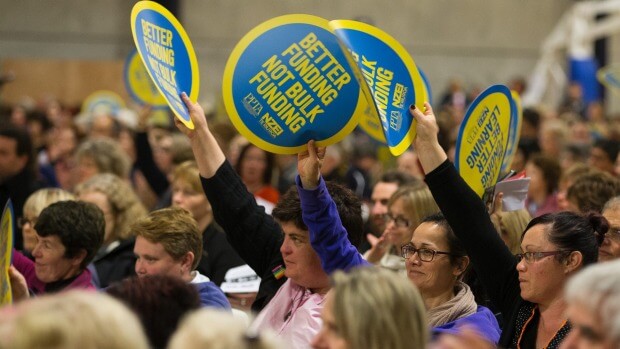Oceanía/Nueva Zelanda/16 de Septiembre de 2016/Autora: Georgia Forrester/Fuente: Stuff
RESUMEN: Un dirigente sindical afirmo que la propuesta del Gobierno de cambiar la financiación de la escuela es el último paso en una «guerra por la reducción de costos» en la educación pública. El Plan de Presupuesto Mundial del Gobierno es parte de una revisión de la financiación del Ministerio de Educación. Se propone combinar la dotación de personal y los costos operativos dentro de las escuelas – un movimiento llamado por los sindicatos como «financiación mayor». Alrededor de 1200 docentes en Palmerston North y trabajadores de apoyo de Palmerston North & M Centro se reunireron el miércoles para escuchar el nuevo Instituto de Educación Zelanda (NZEI) y la Asociación de Maestros de Post-Primaria (PPTA) para hablar de la propuesta. Las escuelas dan garantía de financiación para pagar a los maestros, que es independiente del dinero utilizado para los gastos operativos tales como la energía, artículos de papelería y productos de limpieza. El Plan de Presupuesto Mundial vería que los fondos se combinan con otros ingresos. Hasta las escuelas deben decidir cuánto dinero se destina al personal. El mes pasado, el NZEI y PPTA anunciaron que estarían llevando a cabo más de 50 reuniones en todo el país, con la participación de 60.000 miembros del sindicato para discutir y votar sobre los cambios propuestos. La reunión continuará por todo el país con profesores de Taihape y Dannevirke que asistiran el jueves.
A Government proposal to change school staff funding is the latest move in a «cost cutting war» on public education, says a union leader.
The Government’s global budget plan is part of a Ministry of Education review of funding. It proposes to combine staffing and operational costs within schools – a move dubbed «bulk funding» by the unions.
About 1200 Palmerston North teachers and support workers packed into Palmerston North’s B&M Centre on Wednesday to hear the New Zealand Education Institute (NZEI) and Post-Primary Teachers’ Association (PPTA) speak about the proposal.
Schools are given guaranteed funding to pay for teachers, which is separate from money used for operational costs such as power, stationery and cleaners. The global budget plan would see that funding combined with other revenue. It would then be up to the schools to decide how much money went to staff.
PPTA Manawatu Whanganui executive Rob Torr said the proposal came with «massive risks» that could decrease the quality of education for future New Zealand children.
«In the long [run] while the Government will be able to make significant savings, it will be at the expense of our schools, our members, our students and our communities.»
Staff members from 21 Manawatu schools who attended the meeting, cheered, clapped and waved signs as union members spoke.
NZEI primary teaching sector national executive Liam Rutherford said the reintroduction of bulk funding, the redistribution of special education funding away from school age children and the establishment of online schools represented a «cost cutting war» taking place in public education.
«…This isn’t actually about helping children, but rather they’re shifting responsibility for funding failure from the Government and on to schools.»
NZEI member and Palmerston North teacher aide Sue Nimmo said she loved her job as a support staff worker, but bulk funding, could lead to low wages, fixed contracts, fluctuating hours and limited job security.
Teachers had a chance to band together and campaign against the proposal, she said.
Last week, an advisory committee recommended dropping the plan entirely. It had concerns about extra pressure on staff, uncertainty for schools, and removal of the «ring fence» around resources for teachers.
Education Minister Hekia Parata has previously acknowledged strong opposition to the measure, but would not take it off the table ahead of a Cabinet discussion.
She said the global budget was a mechanism for paying, not about how they put together how much a school should get.
Last month, the NZEI and PPTA announced they would be holding more than 50 meetings around the country, involving 60,000 union members to discuss and vote on the proposed changes.
The meeting continue around the country with teachers from Taihape and Dannevirke attending theirs on Thursday.
Fuente: http://www.stuff.co.nz/national/education/84237893/education-unions-slam-global-funding-proposal-at-palmerston-north-rally







 Users Today : 73
Users Today : 73 Total Users : 35460204
Total Users : 35460204 Views Today : 104
Views Today : 104 Total views : 3418887
Total views : 3418887